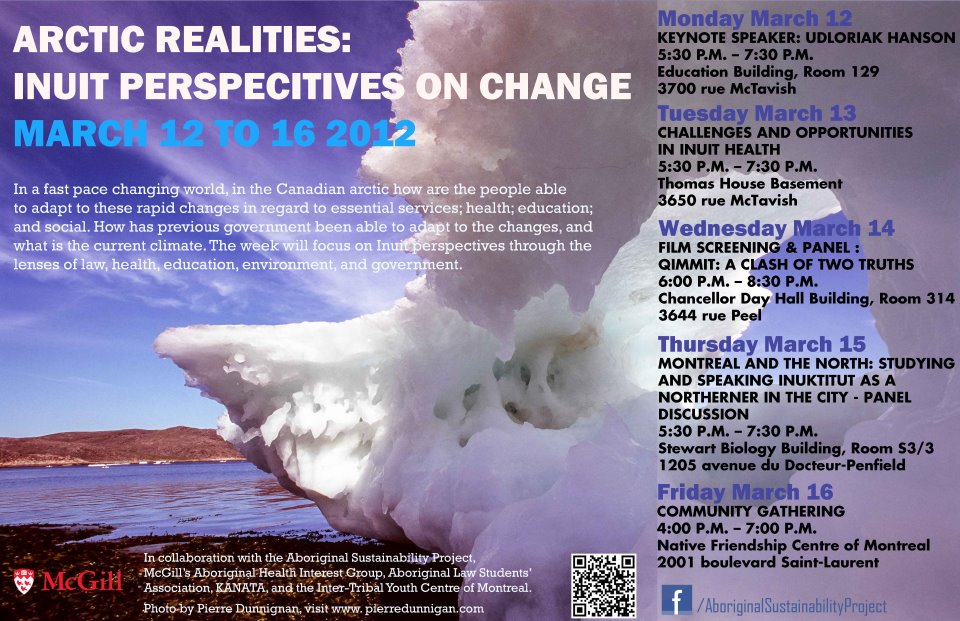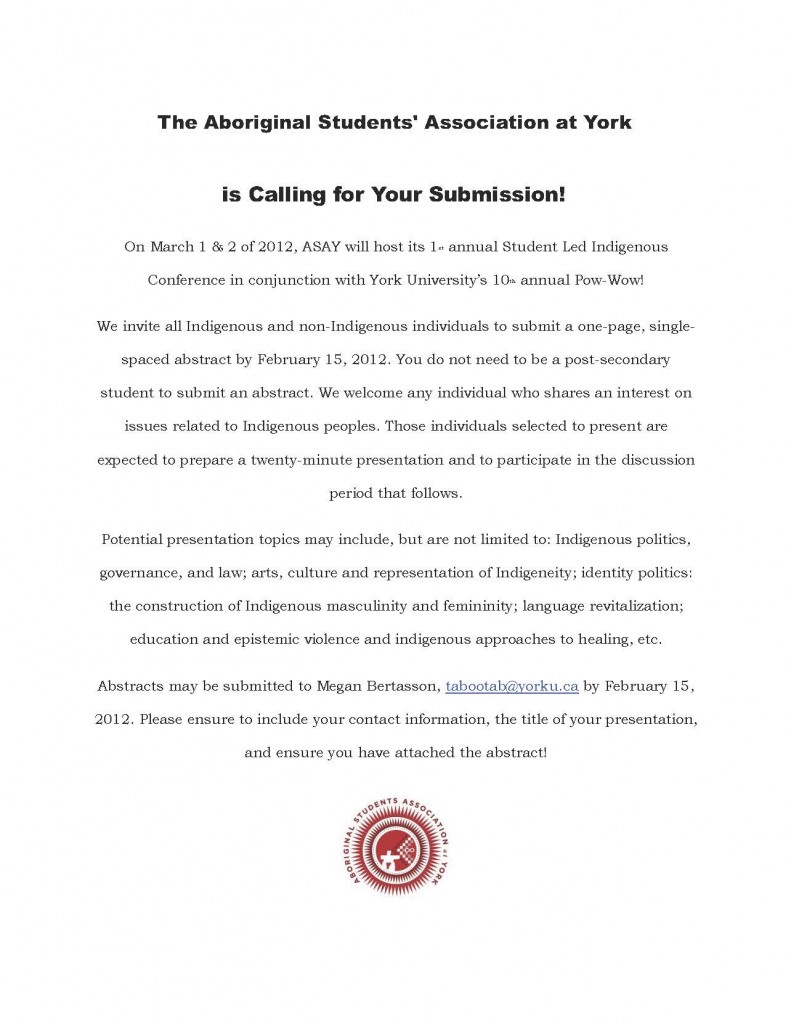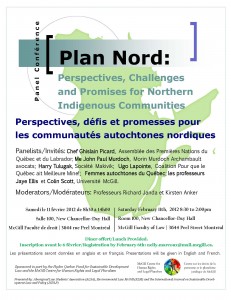March 12 to 16, 2012
All events are free and open to the public.
In a fast pace changing world, in the Canadian arctic how are the people able to adapt to these rapid changes in regard to essential services; health; education; and social. How has previous government been able to adapt to the changes, and what is the current climate. The week will focus onInuit perspectives through the lenses of law, health, education, environment, and government.
For more information, please forward general inquiries to allan.vicaire@mcgill.ca or (514) 398-3711.
=> Monday March 12, 2012
KEYNOTE SPEAKER: UDLORIAK HANSON
5:30 P.M. – 7:30 P.M.
Education Building, Room 129, 3700 rue McTavish
Udloriak Hanson is Special Advisor to Mary Simon, President of Inuit Tapiriit Kanatami. She is currently also ITK’s Acting Executive Director. She has significant experience representing Inuit interests with regard to policy development.
Ms. Hanson has negotiated tri-partite agreements between the Federal Government; the Government of Nunavut; and Nunavut Tunngavik Inc., the territorial land claims organization. She has held senior positions at Nunavut Tunngavik Inc., including Chief Negotiator on the devolution file. Ms. Hanson was also Executive Director of Nunavut’s Qaujisaqtiit Society, the territory’s first consortium of Inuit non-profit organizations.
She was born and raised in Iqaluit, Nunavut, and has undergraduate degrees in business administration and education. She is a frequent guest speaker, nationally and internationally, on issues affecting Inuit across Canada. Ms. Hanson currently serves on the ArcticNet Board of Directors and on the Board of Directors for Tungasuvvingat Inuit in Ottawa.
Hosted by the Aboriginal Sustainability Project.
=> Tuesday March 13, 2012
CHALLENGES AND OPPORTUNITIES IN INUIT HEALTH
5:30 P.M. – 7:30 P.M.
Thomas House Basement, 3650 rue McTavish
Inuit populations face similar health challenges as many of Canada’s indigenous groups — unacceptably high rates of both acute and chronic disease, including respiratory infections, diabetes, and suicide. Yet Inuit culture, as well as the climate and geography of the Arctic environment, add particular complexity to medical care and health promotion for this population.
Minnie Grey is one of the foremost Inuit leaders in the world – a champion for Inuit self-government, and community and economic development, and former Executive Director of the Nunavik Regional Board of Health and Social Services among many other prominent positions. In this session she will share her perspectives on the state of health among Inuit — including the realities of health care and social services, and the interplay of cultural, political and economic factors in determining health status and quality of life for Inuit people.” Minnie Grey, Chief Negotiator for Nunavik self-government Nasivvik
Hosted by McGill Aboriginal Health Interest Group.
=> Wednesday March 14, 2012
FILM SCREENING & PANEL :
QIMMIT: A CLASH OF TWO TRUTHS
6:00 P.M. – 8:30 P.M.
Chancellor Day, Room 314, 3644 rue Peel
A film screening of the NFB documentary Qimmit: A Clash of Two Truths, which addresses allegations of an organized dog slaughter in Nunavut’s Baffin region as well as the changes experienced in the Arctic from the 1950s to the 1970s.
The screening will be followed by a panel discussion with Ole Gjerstad, co-director of the film, and with someone involved in the Qikiqtani Truth Commission, which explored this issue over several years and released its final report in 2010. We have also invited an Inuit Elder who has experienced firsthand the changes that have occurred in the Arctic over the last six decades.
Some light refreshments will be provided.
Hosted by the Aboriginal Law Students’ Association.
=> Thursday March 15, 2012
MONTREAL AND THE NORTH: STUDYING AND SPEAKING INUKTITUT AS A NORTHERNER IN THE CITY – PANEL DISCUSSION
5:30 P.M. – 7:30 P.M.
Stewart Biology, Room S3/3, 1205 Docteur Penfield Ave.
Inuit living in the Arctic who want to attend post-secondary education most certainly have to leave home: there are few opportunities to pursue post-secondary education in the Arctic. The impetus for discussing the relationship between Montreal and the north is to deconstruct the many stereotypes and misconceptions regarding the Indigenous peoples of the Arctic that live, work, study, and visit Montreal. We will be hosting a panel discussion on what it actually means to be an Arctic northerner moving/living in Montreal in an effort to confront these stereotypes and validate individual experiences. Inuit students and staff from John Abbott College will be discussing their experiences in Montreal as people who have moved here from the Arctic.
Included in the panel will also be a presentation and introductory lesson about the language of Inuktituk provided by Inuktituk instructor, Jason Annahatak. Jason is from Kangirsuk, located in the Nunavik region of Quebec. He is fluent in Inuktitut and speaks it at every opportunity. He is currently an Inuktitut instructor to Inuit students at John Abbott college and Cegep Marie-Victorin. He also teaches introductory Inuktitut to the employees of Makivik Corporation.
Hosted by KANATA, Undergraduate Journal of the Indigenous Studies Community of McGill.
=> Friday March 16, 2012
COMMUNITY GATHERING
4:00 P.M. – 7:00 P.M.
Native Friendship Centre of Montreal, 2001 St. Laurent Blvd
Join us in celebrating the end of Arctic Realities with a fun filled evening at the Inter-Tribal Youth Center! The evening will showcase various Inuit activities; throat singing; demonstration of traditional Inuit games; and drumming.
KANATA will be hosting a bake sale and providing coffee and tea.
Hosted by the Inter-Tribal Youth Centre of Montreal.



